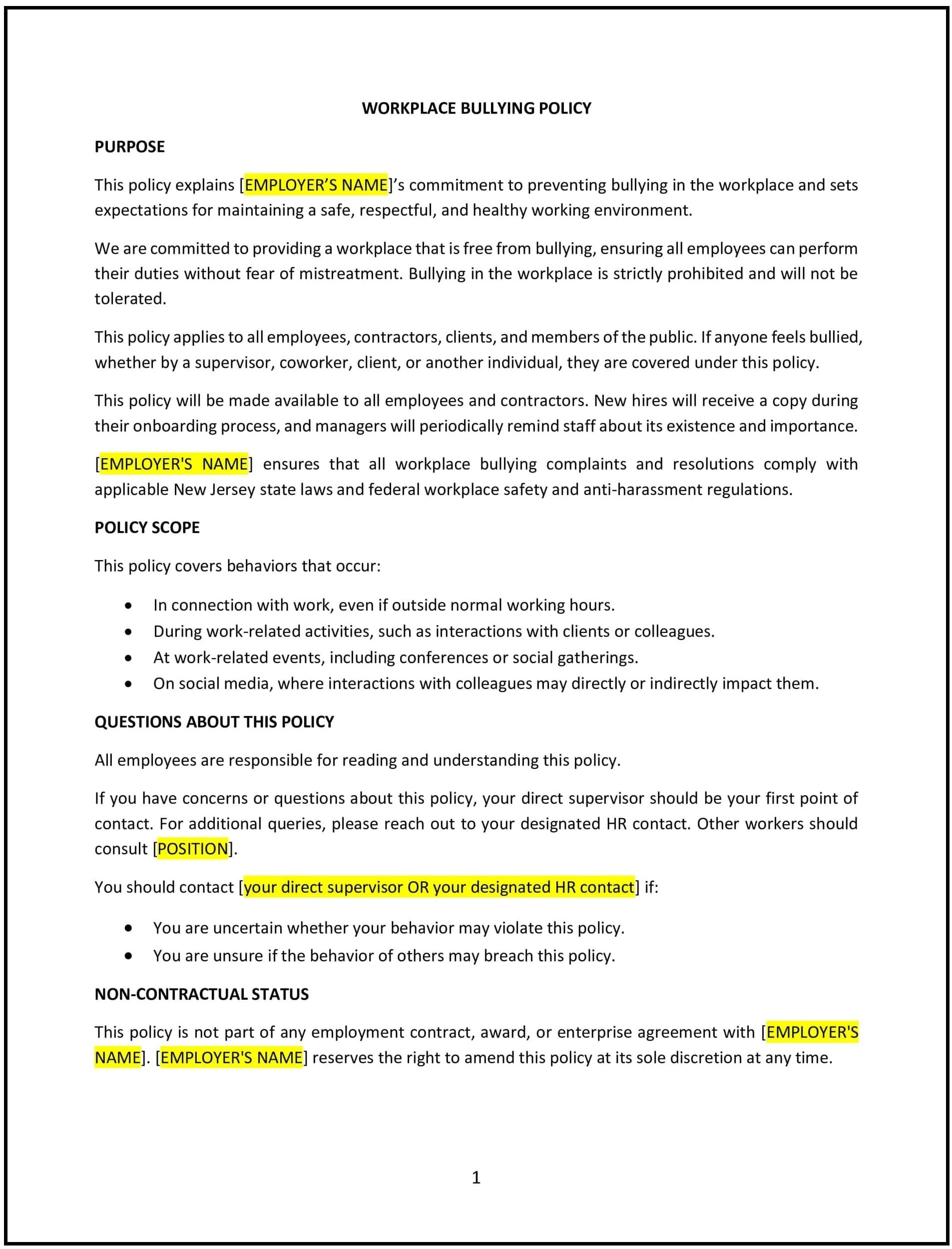Workplace bullying policy (New Jersey): Free template
Got contracts to review? While you're here for policies, let Cobrief make contract review effortless—start your free review now.

Customize this template for free
Workplace bullying policy (New Jersey)
A workplace bullying policy helps New Jersey businesses create a respectful and supportive work environment by addressing bullying behavior and outlining the steps for preventing, reporting, and addressing workplace bullying. This policy defines what constitutes workplace bullying, sets expectations for behavior, and provides clear guidelines for employees and management to follow in order to foster a healthy, professional workplace.
By adopting this policy, businesses in New Jersey can prevent bullying, promote a positive company culture, and protect employees from harmful behavior that can impact morale and productivity.
How to use this workplace bullying policy (New Jersey)
- Define bullying behavior: Clearly define what constitutes workplace bullying, including verbal abuse, threats, intimidation, exclusion, and any behavior that creates a hostile or unsafe environment.
- Set expectations for conduct: Outline the company’s expectations for respectful behavior and conduct in the workplace, emphasizing zero tolerance for bullying or harassment of any kind.
- Establish reporting procedures: Provide a clear process for employees to report incidents of bullying, including whom to contact, how to document the incident, and how confidentiality will be maintained.
- Provide support for affected employees: Offer resources such as counseling or Employee Assistance Programs (EAPs) for employees who are affected by bullying.
- Investigate reports of bullying: Set out procedures for investigating complaints of bullying, ensuring a fair, impartial, and thorough process for both the person making the complaint and the accused.
- Address retaliation: Emphasize that retaliation against employees who report bullying is prohibited, and outline the steps the company will take to protect employees from retaliation.
- Take corrective action: Clearly state the potential consequences for bullying behavior, including disciplinary actions up to and including termination, and ensure that corrective actions are applied consistently.
- Review and update: Regularly review the policy to ensure it aligns with New Jersey regulations and company practices, making any necessary updates as laws or business needs evolve.
Benefits of using this workplace bullying policy (New Jersey)
This policy provides several benefits for New Jersey businesses:
- Promotes a respectful work environment: Helps foster a work culture where employees feel safe, valued, and supported, which enhances overall morale and productivity.
- Reduces the risk of legal disputes: Clearly defined guidelines and procedures help prevent bullying and harassment claims, protecting the company from potential lawsuits or reputational damage.
- Increases employee satisfaction: Demonstrates a commitment to maintaining a safe, supportive workplace, which can improve employee engagement, satisfaction, and retention.
- Improves workplace culture: Promotes mutual respect among employees, reducing conflict and improving collaboration across teams.
- Protects employee well-being: Helps create a safe work environment where employees’ mental health and emotional well-being are prioritized and protected.
Tips for using this workplace bullying policy (New Jersey)
- Communicate the policy clearly: Ensure that all employees are aware of the workplace bullying policy, how to report incidents, and the consequences of bullying behavior.
- Offer training: Provide training for all employees and managers to recognize bullying behaviors and understand the importance of creating a respectful, inclusive workplace.
- Foster open communication: Encourage employees to speak up about bullying or harassment and ensure they feel confident that their concerns will be taken seriously.
- Monitor the workplace environment: Regularly assess the workplace for any signs of bullying or disrespectful behavior and address issues promptly before they escalate.
- Review the policy regularly: Update the policy as needed to reflect changes in New Jersey state law, company procedures, or evolving workplace dynamics.